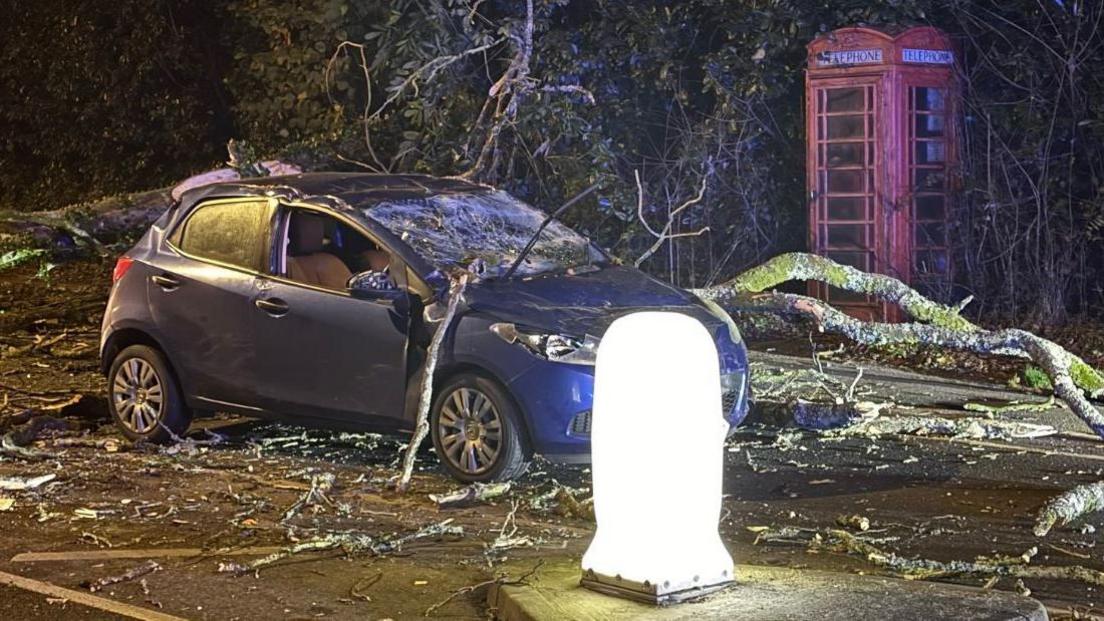Thousands still without power after Storm Darragh
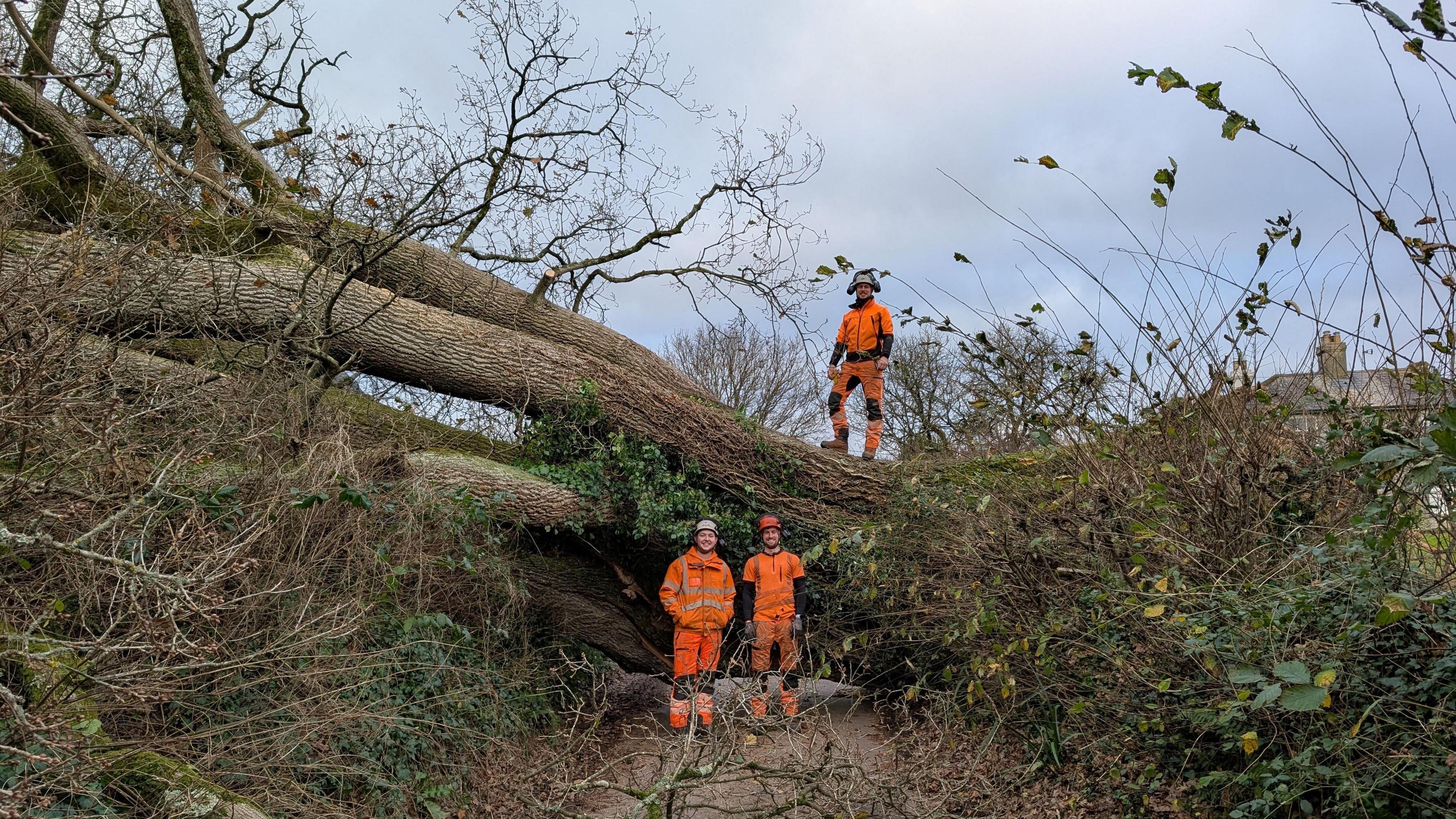
A large tree is blocking a narrow lane in Staverton in Devon
- Published
Thousands of people in Devon and Cornwall are still without power in the aftermath of Storm Darragh.
National Grid said there were still more than 5,000 properties without electricity across both counties on Monday evening.
It said some people may be without power until at least 20:00 GMT, but engineering teams continued "to work hard in challenging weather conditions to restore power supplies".
National Grid said the region "bore the brunt of the awful conditions caused by Storm Darragh" with wind gusting to up to 96mph (155km/h).
It added: "We have made significant progress restoring power to more than 1.5 million customers since it hit our network.
"We'll be aiming to get the remaining customers off supply reconnected as quickly as possible and apologise for the ongoing inconvenience they are facing as they wait for power to be restored."
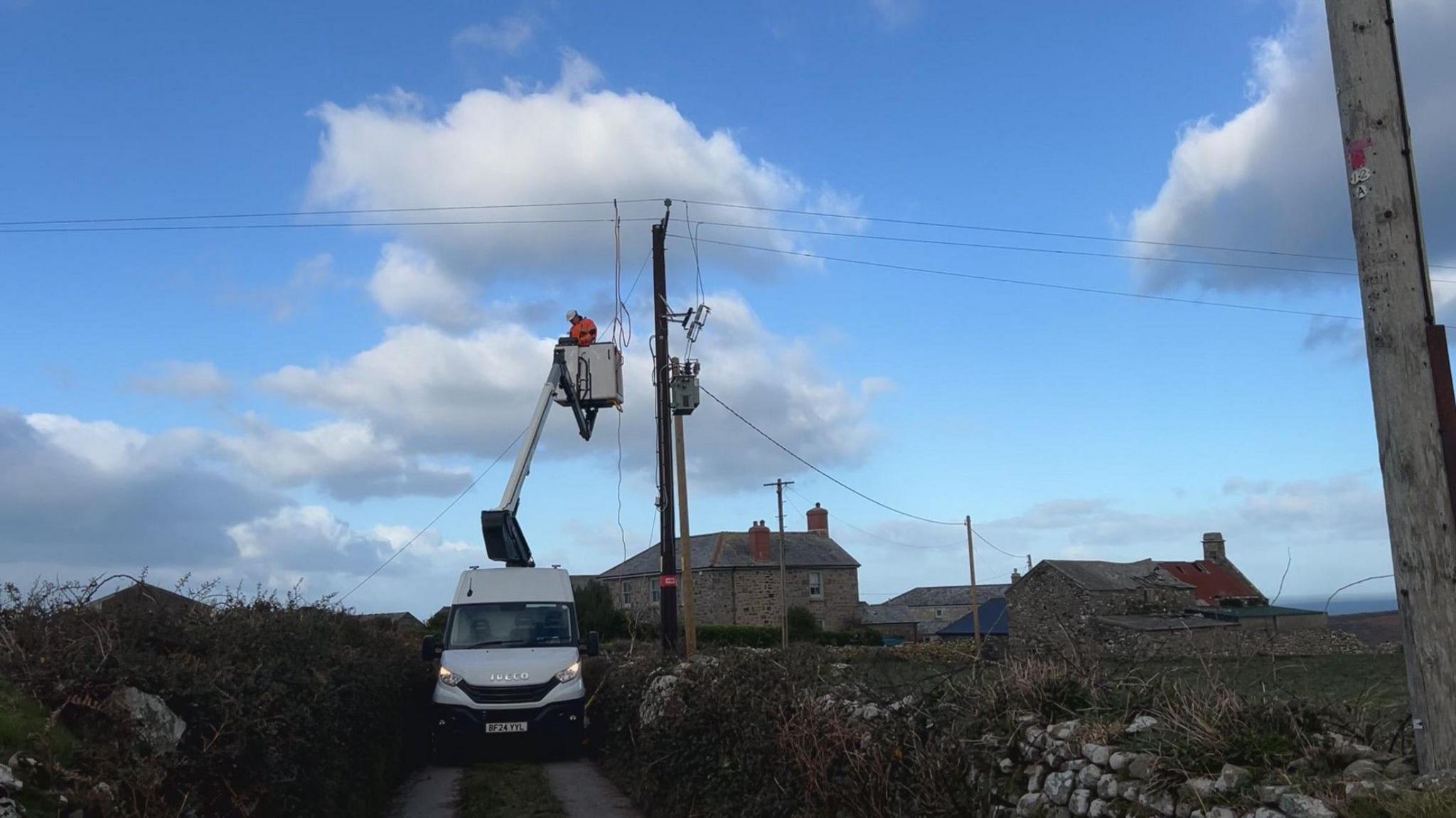
National Grid has been repairing overhead power cables across the region but more than 2,500 homes are still without power
Matt Turner, from National Grid, said he understood being without power was "frustrating" but repair teams, which were "out there all hours in really dreadful weather", appreciated the "patience and kindness" customers showed.
Mr Turner said everything was "heading in the right direction and the hard work really does continue".
He said it had been "challenging" for engineering teams, but more than 875,000 properties had had power restored across the South West.
Mr Turner said some customers who had been without power for 24 hours or longer might be eligible for customer guarantee payments, which utility firms processed without people needing to claim.
'Quite lonely'
One resident, from Landkey in north Devon, said she had been without hot water, heating and electricity since 05:00 GMT on Saturday.
"There's not much signal down here, so you're just sat in the dark doing nothing and there's just silence," Aimee Jarvis told BBC Radio Devon.
"It's quite lonely, which I don't think I've experienced before.
"I know there are people worse off; people with babies who are trying to sort the formula out, or the elderly who are really feeling the cold.
"But, when going to work is the highlight of your day for warmth and electricity, it's a bit of an eye-opener."
Ms Jarvis said power had been due to be restored at 18:00 on Sunday but that had been delayed by 24 hours.
"It's just one of those things - it's a storm, you can't be angry because they're trying their hardest," she added.
Donal Stafford, owner of the Hartland Quay Hotel, said he felt "quite lucky" despite having to close over the weekend.
Speaking to BBC Devon, he said: "We are right on the north-west corner of Devon, just where the Atlantic meets the Bristol Channel. The hotel is at the base of a 300ft (91m) cliff, so we are completely exposed to the northern and western elements, which were dominant over the weekend."
Mr Stafford said the retreat experienced "lots of wind, some roof damage, power cuts and internet outages, but nothing that can't be put back together".
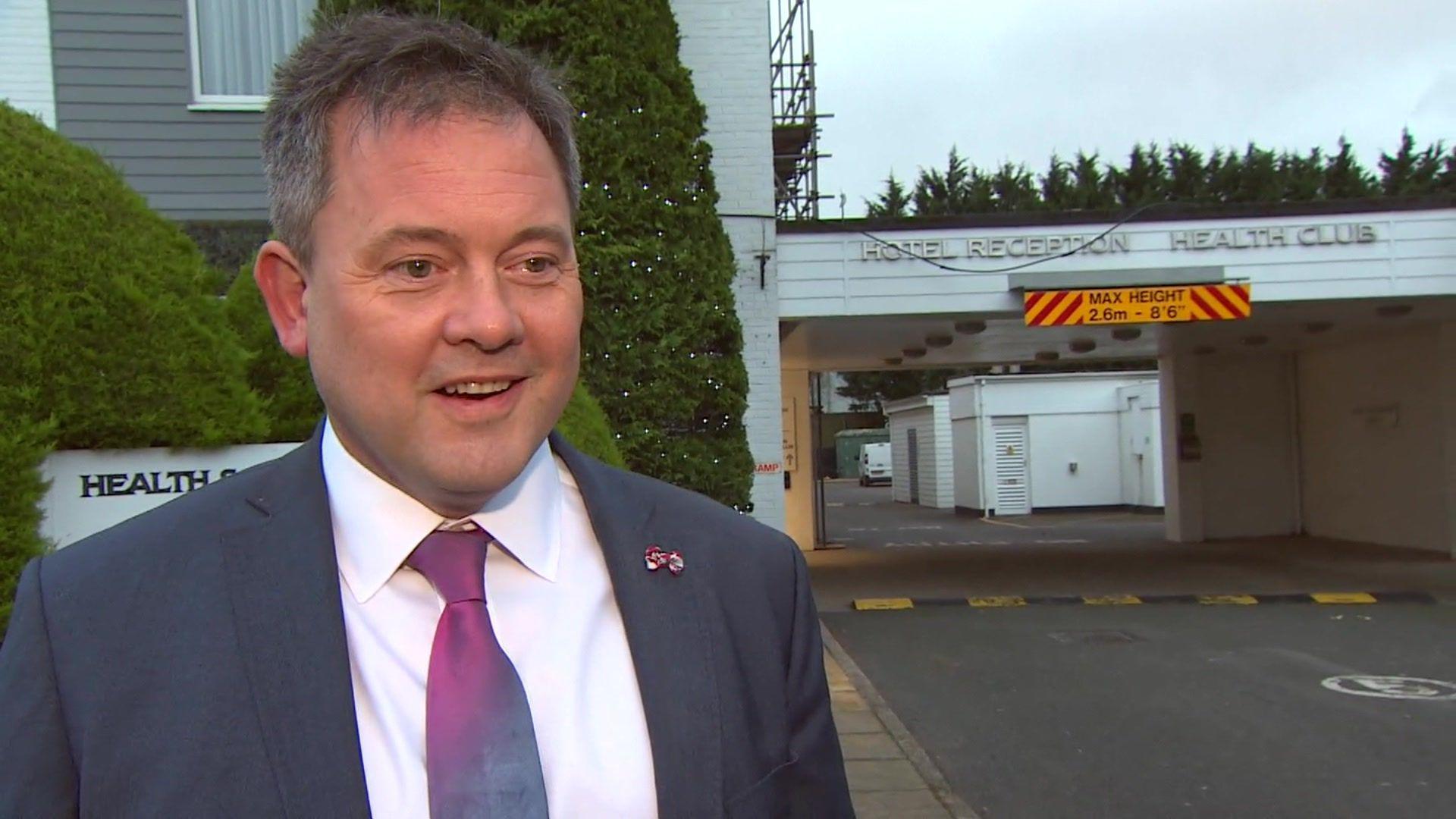
Mr Brend said the hotel's roof "ripped right off" in the storm
Peter Brend, one of the directors at Brend Collection, said The Barnstaple Hotel in north Devon suffered damage after its "roof ripped right off" in the storm on Saturday.
"It was pretty devastating," he said.
"Yesterday's clean up operation was mammoth.
"We had to call in cranes, road sweepers, scaffolders, electricians - every service that you could think of came to our aid and we're really grateful of that."
Darragh was the fourth named storm of the season, following Storm Ashley, Storm Bert and Storm Conall.
Winds were reported as gusting quite widely over 70mph (112km/h), even inland.
The record for the South West is still 118mph (189km/h) at Gwennap Head in Cornwall on 15 December 1979.
BBC South West senior broadcast meteorologist David Braine said: "Deep and rapidly intensifying areas of low pressure are becoming more frequent as a consequence of global warming.
"One of the contributing factors to this storm is the higher-than-normal sea surface temperatures across the Atlantic creating the right conditions for a deep area of low pressure and then slowing it up such that we had sustained storm-force winds."
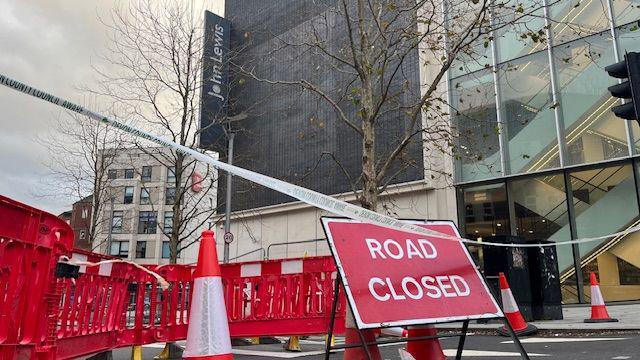
The John Lewis junction in Exeter is closed due to damage from the storm
There has also been continuing rail disruption.
Great Western Railway said "severe weather" closed lines between St Erth and St Ives.
Lines between Liskeard and Looe, plus Plymouth and Gunnislake, were also affected, with services cancelled.
The line between Exeter St David's and Barnstaple was "likely remain closed for the rest of today", rail bosses added.
On the roads in Exeter, the B3183 at the John Lewis junction in the city centre was closed due to storm damage and traffic diverted.
Fire crews were also sent to the scene of a fallen tree in Staverton which entirely blocked a narrow lane near the Devon village.
Community help
Other closures on Monday included Combe Martin Wildlife Park, which estimated it had "at least 20 trees down", causing "significant damage to... enclosures, handrails and footpaths".
Both Bampton Library and Bampton Surgery closed due to "ongoing issues" with power supplies.
Meanwhile, other venues around Devon and Cornwall with power have opened their doors to help provide shelter.
TJ's & LJ's Fish and Chips in Tavistock invited people without power to bring phone chargers and to claim a free hot drink.
Broadclyst Parish Council opened the village hall for anyone affected by power cuts in the area, and Meshaw Barton Farm in South Molton said it had generators on standby for people to charge phones.
The Portsmouth Arms Hotel in Umberleigh has offered the use of its power, showers and cooking facilities.
In a post on social media, it said: "People can stay here until midnight. Feel free to bring your own snacks or food to heat up in the microwaves.
"It's hard enough just now [with] your food being ruined without having to pay more money to eat out."
Safety advice
Cornwall Council has issued safety advice to residents without power.
It said people should:
• Keep a torch or lantern ready and avoid using naked flames such as candles
• Keep a battery or solar charger handy to charge smartphones or tablets
• Make sure their method of heating was safe as gas heaters or open fires unused for a while may be unsafe. Carbon monoxide alarms should also be checked
• Test smoke detectors
• Keep freezers shut - depending on the freezer, the contents could stay frozen for up to 12 hours
Follow BBC Cornwall on X, external, Facebook, external and Instagram, external. Follow BBC Devon on X, external, Facebook, external and Instagram, external. Send your story ideas to spotlight@bbc.co.uk, external.
Related topics
- Published7 December 2024
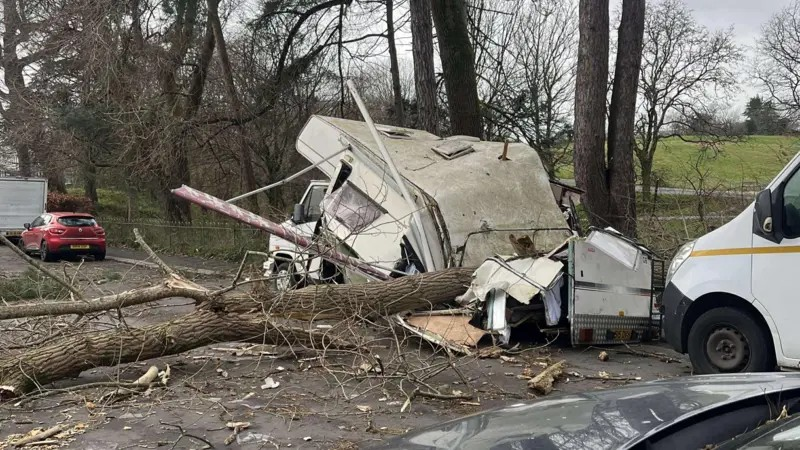
- Published8 December 2024
